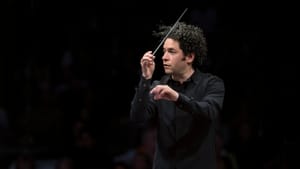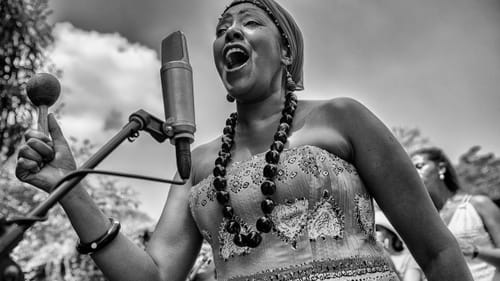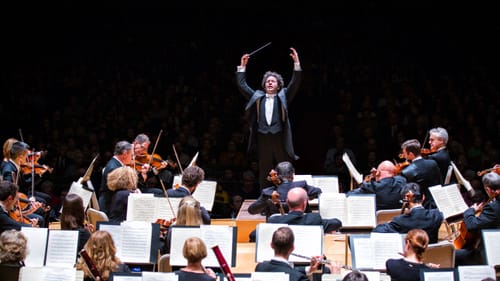Stay in the Loop
BSR publishes on a weekly schedule, with an email newsletter every Wednesday and Thursday morning. There’s no paywall, and subscribing is always free.
A date with Dudamel
Gustavo Dudamel in residency at Princeton University

So there he was. Live, in person, and in residency at Princeton University, one of the classical-music world’s top celebrities: Gustavo Dudamel.
With tousled hair, rumpled jeans, a sweater, and work shoes, the international luminary reminds you more of your neighbor’s kid brother than a podium powerhouse changing the face of music around the world. He slouched back a little in the soft leather chair, a regular guy at peace with himself and his surroundings, but there was just a slight halo of angst, like a whiff of jet lag that never leaves, enough to make you wonder what he would do or say next.
His eyes twinkled, as though he was thinking, “What am I doing here?” But the conversation was unforced, flowing, and illuminating. Dudamel’s self-deprecating sense of humor dissolved any sense of separation between audience and stage.
Dudamel on the East Coast
Thanks to the generosity and inclusiveness of Princeton University Concerts, there was open seating and no charge to the public for the “Inside the Actor’s Studio”-style interview on December 1, deftly conducted by Princeton alumnus and musicologist Don Michael Randel.
Part two of the interview continued the following night, led by Deborah Borda, president of the New York Philharmonic and the genius who first detected and encouraged Dudamel’s gifts on the West Coast, where he is music director of the Los Angeles Philharmonic. The interviews kicked off Dudamel’s residency at Princeton through spring 2019, in celebration of the 125th anniversary of the series. While visiting the East Coast, he will also be conducting the Metropolitan Opera Orchestra for the first time, with performances of Verdi’s Otello later this month.
Vibrant Venezuela
Randel walked Dudamel through an extended recollection of his childhood in Venezuela, a uniquely music-friendly country. Today, Americans know Venezuela mostly for its social and economic breakdown, with one of the highest per-capita murder rates in the world and inflation approaching one million percent this year.

Yet a rich cultural heritage sustains the people, both in Dudamel’s poor but happy childhood and today. We got a vivid taste of that following the interview, with a rousing performance of traditional holiday songs sung by “the voice of Venezuela,” Betsayda Machado, and three other phenomenal musicians.
During the conversation, Dudamel gave glimpses of his own context as well as his philosophy of music, expressed in Venezuela’s El Sistema program, which includes making private lessons and access to instruments available to all young children, including those experiencing poverty.
Musical bon mots
With prompts by Randel, the affable conductor offered a few bon mots. He explained that conductors might be inscrutable figures to the audience, apparently doing nothing, but in reality, they’re motivating and inspiring the musicians. Much has changed since days of conductors like Toscanini, who would literally scream at their musicians. “It all starts with respect,” Dudamel said. “It’s so easy to be arrogant, but the first thing is to respect all of the musicians.”
“When I conducted the Vienna Philharmonic, there were musicians whose family members worked with Tchaikovsky or Stravinsky,” he said, reflecting on his rise to fame. “The first cellist told me his grandfather played with Mahler! They have a direct line to the great composers, and you think, What the hell am I doing here?”
Dudamel doesn’t believe that traditional “classical” music isn’t accessible to young people. They’re open to all kinds of music. “I love Pink Floyd, the Beatles; I loved Latin music first, then Beethoven,” he explained. “It can’t just be for a little group of people who are not my age. You have to enlarge the box.” He laments that music is often the first class to be cut in struggling schools.
There were plenty of anecdotes. Dudamel recalled being in Buenos Aires for a concert and noting a mob of young people in the lobby of his hotel. “I was so arrogant, I assumed they were all there for me!” he said. As it turned out, Katy Perry also was staying in the hotel. “That was 1,000 fans for Katy Perry, and two for me — my driver and my assistant!” he laughed. Two nights later, Katy Perry was singing with him as he conducted the Hollywood Bowl Youth Orchestra.

A Met quartet, and more
The second day of the residency kickoff opened with a musical preview by students from the Boston String Academy, an El Sistema-inspired program, followed by a concert by Quartet 212, a string quartet composed of Metropolitan Opera musicians. The concert and part two of the conversation with Dudamel were ticketed events, but for a very affordable price.
The program consisted of Haydn’s String Quartet No. 41; Respighi’s Il Tramonto for mezzo-soprano and string quartet; the world premiere of Strange Folk, an energetic tribute to country fiddling by Princeton professor Donnacha Dennehy; and Verdi’s String Quartet in E minor.
I was most impressed by the articulation, synchronicity, and insight of this ensemble, whose members seemed born to play together. While maintaining the credo of the string quartet — four musicians, one voice — the musicians did emerge individually as independent personalities of the highest musicianship, yet the consistency and flavor of the one voice remained vivid through each selection. Mezzo Emily D’Angelo was impeccable and heartfelt in the tender Il Tramonto, based on Percy Bysshe Shelley’s poem “The Sunset.” It reminded me of Chausson’s Poem of Love and the Sea with the Philadelphia Orchestra in November (here’s the BSR review).
More residency-related events unfold through Spring 2019, many of them free. Princeton is just a skip up I-95, and it's the destination of much exciting music news this season.
You can help keep BSR going strong in 2019 and beyond. Make your gift here.
What, When, Where
Gustavo Dudamel, in conversation. Betsayda Machado, singer, in traditional Venezuelan holiday songs. Quartet 212 in Franz Joseph Haydn’s String Quartet No. 41 in D major, Op. 50 No. 6; Ottarino Respighi’s Il Tramonto with mezzo-soprano Emily D’Angelo; Donnacha Dennehy’s Strange Folk (world premiere); and Giuseppe Verdi’s String Quartet in E minor. December 1-2, 2018, at Princeton University’s Richardson Auditorium of Alexander Hall, 68 Nassau Street, Princeton, NJ. or princeton.edu.
Sign up for our newsletter
All of the week's new articles, all in one place. Sign up for the free weekly BSR newsletters, and don't miss a conversation.

 Linda Holt
Linda Holt